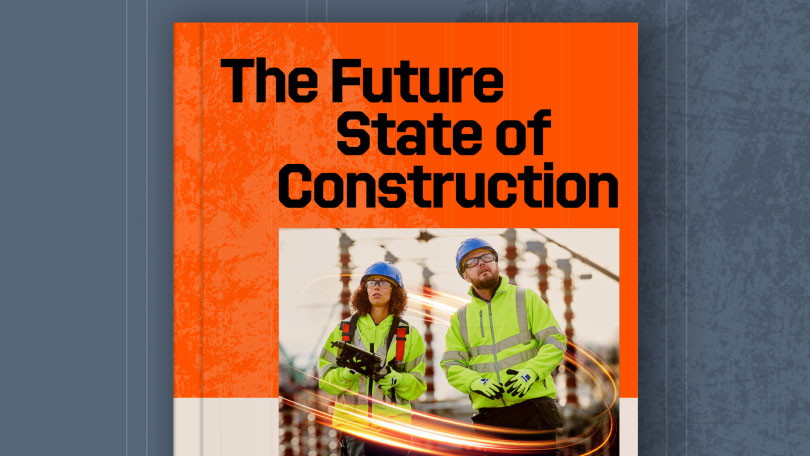— 4 min read
Tackling Productivity Inefficiencies Before They Challenge Your Bottom Line

Last Updated Aug 28, 2025

Nicholas Dunbar
Content Manager
65 articles
Nick Dunbar oversees the creation and management of UK and Ireland educational content at Procore. Previously, he worked as a sustainability writer at the Building Research Establishment and served as a sustainability consultant within the built environment sector. Nick holds degrees in industrial sustainability and environmental sciences and lives in Camden, London.
Last Updated Aug 28, 2025

Small missteps - an outdated drawing, a late material order, a half‑day of idle labour - rarely stay small. Multiply them across dozens of crews, thousands of line items, and a tight schedule, and you get blown budgets and missed milestones. The good news: you can spot and resolve most of these productivity leaks long before they reach the site. The key is a data‑driven preconstruction process that feeds insight back into every phase of work.
According to Procore’s 2025 Future State of Construction (FSoC), nearly one‑third (29 %) of total project time is currently spent on rework or rectifying issues — time that could be recaptured with better early‑stage planning.
The report distills insights from more than 1,000 construction leaders worldwide, covering productivity, workforce shifts, decision‑making, and design trends. Keep it nearby - its data points anchor every recommendation that follows.
Table of contents
Diagnosing the Productivity Gap
Traditional construction workflows hide risk in plain sight. Siloed spreadsheets, one‑off emails, and paper plans create three blind spots:
- Unseen Costs – Without a single source of truth, teams underestimate labour, equipment, or escalation, eroding already famously thin margins.
- Fragmented Accountability – When scope and cost data live in separate systems, no one sees the full risk picture.
- Delayed Signals – Problems surface only after crews are onsite, when changes cost 5–10× more.
The productivity gap transcends insufficient or poor data. It's about building intelligence that compounds with every project. In other words, every task you track today should make you faster and more efficient tomorrow.
One UK contractor used unified preconstruction estimating and scheduling to cut change‑order cost exposure by 18 % on a £40 M hospital expansion, saving roughly £1.2 M and trimming two weeks off hand‑over.
The Role of Data‑Driven Decision‑Making
Construction doesn’t suffer from a decision‑making problem; it suffers from an information problem. Seasoned site managers can sense when something is off, but they need data to confirm - and correct - those hunches.
The Data Loop
- Plan – During preconstruction, estimate, schedule, and model in one environment.
- Build – Capture field data (RFIs, site diaries, quantities, safety) in real time.
- Learn – Push actuals back into your cost and schedule baselines.
- Improve – Use the growing “data lake” to refine unit rates, crew sizes, and sequencing for the next project.
Firms that close this loop achieve double‑digit gains in schedule reliability and cost predictability.
Collaborative Tools: Capturing Time and Cost Savings
Integrated delivery platforms replace email chains and spreadsheet juggling with live dashboards everyone can see. Jason Brenner, Procore’s Head of Industry, puts it plainly:
“When everyone works from the same platform, we save thousands of pounds in redundant meetings and rework.”
Centralising tasks, RFIs, and cost events lets project managers:
- Reallocate under‑utilised crews within hours, not days.
- Spot material lead‑time issues weeks earlier.
- Generate owner updates in minutes, freeing teams on site to build.
Artificial Intelligence and Next‑Gen Technology
“Buildings are more complex than airplanes,” says AI entrepreneur Clifton Harness. Machine learning excels at seeing that complexity - flagging schedule clashes, forecasting labour overruns, and highlighting safety risks before they escalate. According to the FSoC report, AI and automation will not replace workers; they will “augment them,” making jobsites safer and dramatically reducing rework.
Practical AI wins now available:
• Automated clash detection for BIM that updates with every model revision.
• Predictive cost forecasting that warns when spend curves drift.
• Smart photo analysis that verifies installation quality daily.
On the estimating side, AI‑driven quantity‑take‑off tools are shaving up to 70% of take‑off time, giving precon teams days—not hours—to analyse alternatives and lock in best‑value suppliers.
And this is just the starting line. 69 % of leaders in the FSoC and How We Build Now surveys are already piloting AI or plan to within a year, and 55 % expect automation to upend the industry in the next five. With 77 % calling BIM “extremely valuable” for project outcomes, expect AI‑powered design collaboration and on‑site robotics to advance quickly - turning today’s early wins into tomorrow’s standard practice.
Actionable Steps to Reduce Inefficiencies
Use the checklist below during your next project kickoff. Share it with every stakeholder - owner, architect, contractor, and trade partners - so accountability is baked in from day one.
Preconstruction Productivity Checklist
- Standardise Data Capture: Agree on cost codes, naming conventions, and dashboard KPIs.
- Create a Unified Source of Truth: House estimates, schedules, and models on a single cloud platform.
- Assign Ownership of Productivity Metrics: Make one person responsible for labour efficiency, another for material flow, etc.
- Automate Real‑Time Field Reporting: Replace manual daily logs with mobile forms that auto‑sync to dashboards.
- Schedule Weekly “Data Huddles”: Review leading indicators - RFIs per CSI division, crew output, and variance trends.
- Close the Loop Post‑Project: Archive actuals into a searchable data lake; adjust master estimates accordingly.
Explore the Future State of Construction
Catching productivity leaks early is one of the most reliable ways to protect margin and hit delivery dates. Advanced preconstruction workflows, continuous data capture, and AI‑powered insights let you act on problems while they’re still cheap to fix.
Backed by data from 1,000+ executives across 14 countries, the FSoC report is the industry’s most comprehensive productivity benchmark to date.
Download your free, 35‑page Future State of Construction report now.
Categories:
Written by

Nicholas Dunbar
Content Manager | Procore
65 articles
Nick Dunbar oversees the creation and management of UK and Ireland educational content at Procore. Previously, he worked as a sustainability writer at the Building Research Establishment and served as a sustainability consultant within the built environment sector. Nick holds degrees in industrial sustainability and environmental sciences and lives in Camden, London.
View profileExplore more helpful resources

Integrated Compliance: A Main Contractor’s Guide to ISO 9001, 14001, 45001, and 44001
For UK main contractors, ISO 9001, 14001, and 45001 are fundamental prerequisites to any tendering activity. The Building Safety Act, Net Zero targets, and tight margins mean these certifications are...

The Main Contractor’s Action Plan for Commercial Risk
For UK main contractors, managing risk protects project margins, rather than solely acting as a compliance exercise. Construction is an industry defined by thin profits and high liability, and a...

Construction Action Plans: Minimising Risk & Maximising Delivery
A construction project is a complex set of tasks, resources, and stakeholders. Without a clear, documented path forward, even meticulous planning can lead to delays, cost overruns, and disputes. The...

Construction Drawings: Guide to Types & Regulations
While architects, urban planners and landscape designers first conceive buildings and public realms in their minds, translating vision into detailed drawings remains the foundation for any project. Construction drawings translate...
